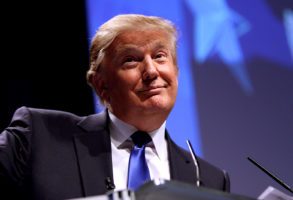
Published January 11, 2017
For months, activists and opposition researchers have circulated a report making explosive allegations about President-elect Donald Trump and his links to Russia. The report suggests that Russia has been “cultivating, supporting, and assisting” Trump, and has collected a file of compromising information on him, including incriminating details about his finances and his personal life. At a Wednesday press conference, Trump denied the report, calling it “fake news, phony stuff” and saying “it should never have been released.”
And Trump has a point. Up until recently, no journalistic outlet would publish the information because it could not be verified. But on Tuesday, BuzzFeed took the plunge and pressed “publish” anyway.
So we should read this report very skeptically, and then we should let it go. Here’s why.
1. We should be skeptical of everyone and everything. Trump’s links to Russia are very suspicious. His professed admiration for Putin, his relationship with Paul Manafort, and his actions to remove confrontation with Russia over Ukraine from the Republican Party platform all raise eyebrows. But the idea that Trump is some sort of sleeper agent or Putin puppet goes too far. This reminds me of the freakout that ensued when it was revealed that ExxonMobil CEO and secretary of state nominee Rex Tillerson had a good relationship with Putin. Of course he’s going to have a good relationship with the authoritarian kleptocrat of a country where his company does major business: That’s his job! Putin does not have some sort of magical mind-control powers. He is not directly controlling Tillerson, and by the same token, it seems hard to believe that Putin can directly control Trump. Yes, be suspicious of Trump’s ties to Russia, but also be suspicious of sensational, overly-simplistic generalizations about how political relationships work.
2. The most salacious parts of the report don’t pass the smell test. The files released Tuesday suggest Russia has proof of questionable sexual behavior on behalf of Trump, and might have tried to leverage that proof to gain cooperation from Trump. This would seem to be an attempt at what’s known as “kompromat” — sexual entrapment followed by blackmail. This is a time-honored Russian intelligence tradition, and indeed a KGB specialty. But I have a hard time believing that Trump would let himself be blackmailed with salacious information such as this. After all, the public already knows, based on the Access Hollywood tape released before the election, that Trump has a history of making lewd sexual comments and bragging about groping women. And voters elected him anyway. Even beyond the details of this report, I just don’t buy the premise that this kind of blackmail would ever work on Trump.
3. Follow the money. Salacious stories are irresistible to the media. But if I had to guess where Trump’s links to Russia are at their most juicy and objectionable, I would bet on his companies’ financial links to Russia. We know because of his history with bankruptcy Trump has struggled to find financing from Western banks and has sought financing from foreign countries, banks, and oligarchs. And we know it’s likely Trump has done business in Russia. Putin uses financing from Kremlin-linked banks to advance Russian interests. My hunch is that the real scandal lies in the web of financial links between Trump and his companies and Russia, but that it’s going to take longer to come out. Why? Because poring over financial statements is a lot harder for a journalist to do than copying and pasting dodgy sex allegations.
4. We are too disoriented to respond right now. Hyper-partisanship is making it very hard to follow this story cogently. Republican officials who used to be Putin’s worst enemy are now waving off Trump’s close relationship with him. Meanwhile, the largely progressive media is treating the U.S. intelligence community’s words as Gospel when it alleges links between Russia and RNC hacks. This is despite the fact that U.S. intelligence has gotten a lot wrong in the past. What I mean is that this post-truth, fake-news, biased press, hyper-partisan era is exactly the wrong context for getting to the bottom of a fantastically important story, one that is probably more complex than a blackmail scenario. Trump’s biggest asset has been driving his opponents batty. Let’s not fall for it a hundredth time.
Pascal-Emmanuel Gobry is a fellow at the Ethics and Public Policy Center.








